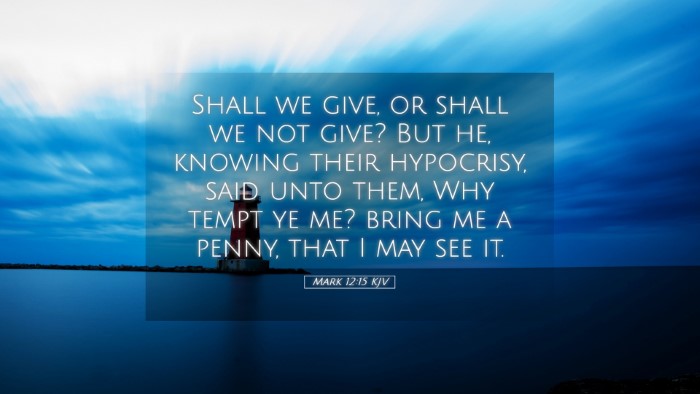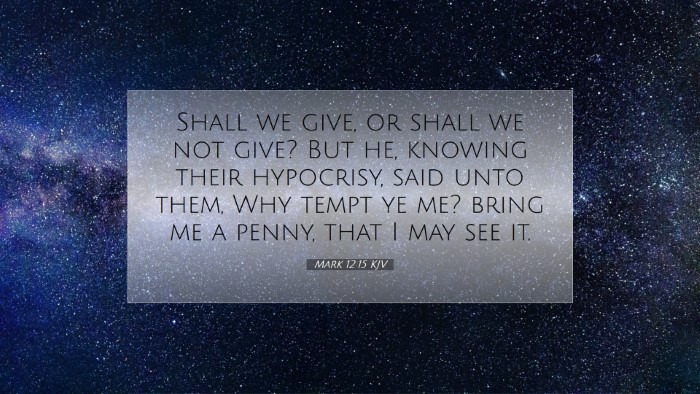Commentary on Mark 12:15
Mark 12:15 (KJV): "Shall we give, or shall we not give? But he, knowing their hypocrisy, said unto them, Why tempt ye me? bring me a penny, that I may see it."
This verse is pivotal, illustrating a critical moment in Jesus' ministry where He confronts the duplicity of the Pharisees and Herodians. In this commentary, we gather insights from several public domain sources, including the works of Matthew Henry, Albert Barnes, and Adam Clarke, to provide a profound understanding of the verse.
Context and Background
Before delving into the text, it is essential to understand the context in which this passage occurs. Jesus is in Jerusalem shortly before His crucifixion. His authority is being questioned by the religious leaders who seek to undermine Him. This particular question about paying taxes to Caesar is intended to trap Jesus, exposing Him to potential accusations of treason against Rome.
-
Matthew Henry: Henry notes the strategic nature of the question posed to Jesus, highlighting the attempt to force Him into a political dilemma. If He advocates for paying taxes, He risks alienating the Jewish populace, who resent Roman authority; if He opposes it, He opens Himself to charges of insurrection.
-
Albert Barnes: Barnes elaborates that the question arose out of malice, with the aim to incite either the Romans or the Jews against Jesus. Their hypocrisy is clear, as they feign a desire for truth while aiming to trap Him.
-
Adam Clarke: Clarke emphasizes the historical backdrop of Roman taxation that weighed heavily on the Jews, making the question particularly inflammatory.
Analysis of "Shall we give, or shall we not give?"
The inquiry itself exposes the heart of the issue: the interplay between civil duty and spiritual devotion. The Jedi is thereby placed in an unjust predicament—either choice could lead to dire consequences.
-
Matthew Henry: He remarks that the language suggests a challenge to authority, implying the tension between the governing powers and God's sovereignty. Jesus’ response transcends the immediate question, directing attention to a more profound principle.
-
Albert Barnes: Barnes observes that Jesus refrains from providing a simple "yes" or "no," instead shifting the focus onto the moral implications of the question. He is not interested in mere legalistic debates but rather seeks to illuminate the greater truth behind earthly obligations.
-
Adam Clarke: Clarke illustrates how this rhetorical engagement unveils Jesus’ wisdom in handling complex moral dilemmas, inviting deeper reflection rather than confrontation.
"But he, knowing their hypocrisy, said unto them..."
The awareness of their hypocrisy is central to Jesus' indictment of the religious leaders. The use of the term "hypocrisy" indicates that these leaders were not earnest in their query but were instead seeking to expose Jesus to danger.
-
Matthew Henry: Notes that Jesus’ perception of their hearts reveals His omniscience. He knew their motives and addressed the issue of their character before tackling the question.
-
Albert Barnes: Expands this insight by suggesting that Jesus' retort serves as a clarion call against insincerity in faith and leadership, thus setting an example for His followers to always embody truth and integrity.
-
Adam Clarke: Clarke points out that this moment serves as a direct challenge to the Pharisees' moral standing. Their attempts to ensnare Jesus reflect a broader spiritual malaise within their leadership.
"Why tempt ye me?"
Jesus directly questions their intent, framing their inquiry as a test of His authority and wisdom. The word "tempt" carries significant connotations, suggesting that they sought to lure Him into a moral quandary.
-
Matthew Henry: Emphasizes that this question highlights the futility of trying to trap the omniscient Son of God. The urgency with which the Pharisees act underscores their desperation in maintaining control.
-
Albert Barnes: Suggests that this question is not merely rhetorical; it serves as a rebuke of their efforts and a call to genuine dialogue. Jesus challenges them to examine their motives critically.
-
Adam Clarke: Clarke interprets this inquiry as a clarion call for authenticity. The confrontation invites deeper reflection on the nature of faith and righteousness, urging onlookers to consider their own sincerity.
"Bring me a penny, that I may see it."
In asking for a coin, Jesus shifts from debate to a tangible object lesson. The "penny," or denarius, symbolizes earthly authority and currency, allowing Jesus to draw a connection between secular and spiritual responsibilities.
-
Matthew Henry: Observes that this action signifies Jesus' acceptance of the realities of earthly governance. He did not advocate for revolution but rather a proper understanding of where our obligations lie.
-
Albert Barnes: Points out the strategic brilliance in this request. By presenting the coin, He illustrates the insignificance of the physical realm compared to the kingdom of God, establishing a guiding principle for believers.
-
Adam Clarke: Highlights that this engages the crowd, prompting them to consider the implications of their socio-political and spiritual allegiance, further enhancing Jesus’ teaching moment.
Theological Implications
The conversation Jesus initiates regarding the coin leads to profound implications about the duality of Christian life in relation to worldly governance and spiritual authority. It invites discourse on the nature of our responsibilities towards secular authorities while remaining committed to divine sovereignty.
-
Matthew Henry: Mentions that this illustrates the balance Christians must maintain between respecting earthly authorities while ultimately submitting to God's higher authority.
-
Albert Barnes: Emphasizes the importance of understanding our role within secular systems without compromising our faith, leading to a constructive engagement with society rather than withdrawal from it.
-
Adam Clarke: Argues that this moment is a reminder for believers to recognize that all authority comes from God, and thus our submission to earthly governance must not conflict with our ultimate allegiance to Him.
Conclusion
Mark 12:15 encapsulates a vital teaching of Jesus regarding the dynamics of faith, duty, and integrity. The insights drawn from the public domain commentaries highlight the layered meanings within the verse, emphasizing Jesus’ wisdom amidst challenges. For pastors, students, theologians, and scholars, this passage serves as a reminder of the importance of sincerity in leadership and the necessity of engaging with the world around us while remaining anchored in the truths of the Kingdom of God.


